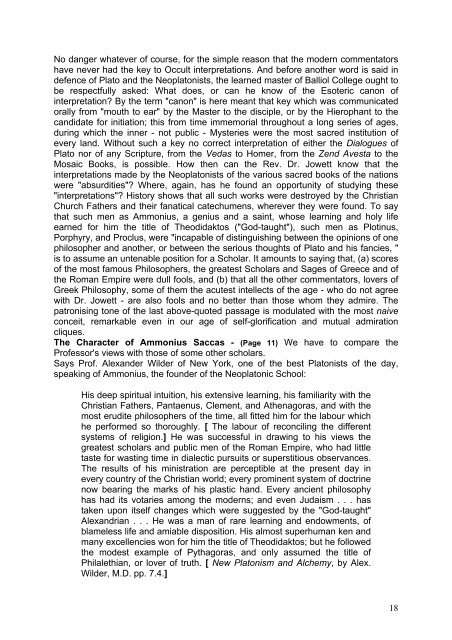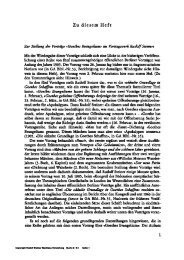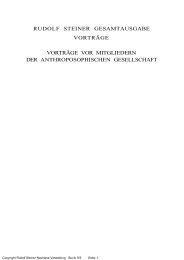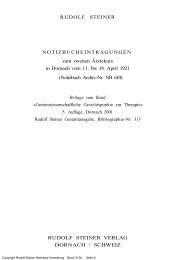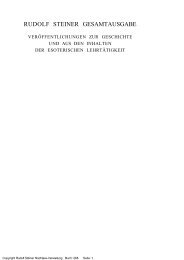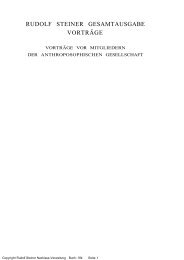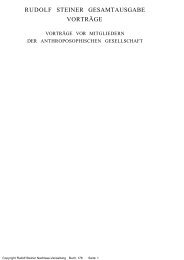- Page 1 and 2: THE SECRET DOCTRINE VOLUME 3 by H.P
- Page 3 and 4: The Bible and Word-Juggling 6 73 Mo
- Page 5 and 6: Are there Angels in Stars 24 221 Ea
- Page 7 and 8: The Buddha cannot Reincarnate 43 37
- Page 9 and 10: Fear and Hatred 52 541 Triangle and
- Page 11 and 12: INTRODUCTORY ( Page 1) "POWER belon
- Page 13 and 14: "Which even the initiated priests [
- Page 15 and 16: the tablet should have happened wit
- Page 17: itself over the whole body of the M
- Page 21 and 22: Pantaenus, Athenagoras, and Clement
- Page 23 and 24: of Sakya, as they prevailed in Udya
- Page 25 and 26: egularly from east to west before t
- Page 27 and 28: The Tree of Knowledge - (Page 21) M
- Page 29 and 30: trunk of Magic - Spiritualism and t
- Page 31 and 32: experimenter uses in his case with
- Page 33 and 34: to the Synedrion: "If this doctrine
- Page 35 and 36: in what modern criticism is pleased
- Page 37 and 38: [ Psellus, 4: in Cory's Ancient Fra
- Page 39 and 40: inscriptions of the Fourth Dynasty,
- Page 41 and 42: Bearing in mind the objections that
- Page 43 and 44: “Great Extreme,” or to give the
- Page 45 and 46: Chaldaeans, who got them from the A
- Page 47 and 48: The “Dark Sayings” of the “Te
- Page 49 and 50: detached from any selfish personal
- Page 51 and 52: Alchemist; they have flashed like i
- Page 53 and 54: still is, that which was called by
- Page 55 and 56: prototype, never through his lower
- Page 57 and 58: Bliss and the “Kingdom of Heaven,
- Page 59 and 60: series of births and Karmic law, th
- Page 61 and 62: shown even by Eliphas Levi, the lea
- Page 63 and 64: in the modern system of the “corr
- Page 65 and 66: Fifth Race, the inheritors of the R
- Page 67 and 68: Man’s Ego - the spiritual princip
- Page 69 and 70:
Kabalistic, Occult work, and he the
- Page 71 and 72:
and impartial seekers after religio
- Page 73 and 74:
The accounts also for the unwilling
- Page 75 and 76:
the sun in heaven. The whole of the
- Page 77 and 78:
not, therefore, from “pork” tha
- Page 79 and 80:
cutting off Christ,” [ Those who
- Page 81 and 82:
Numbers and Measures - (Page 95) Hi
- Page 83 and 84:
of those systems can ever be unders
- Page 85 and 86:
Lives.” In the oldest kabalistic
- Page 87 and 88:
placed at the commencement showing
- Page 89 and 90:
disposed of rival schools by profes
- Page 91 and 92:
or that Religion by their respectiv
- Page 93 and 94:
say the same, on (to him) scientifi
- Page 95 and 96:
as idiotes - a person unskilful in
- Page 97 and 98:
dogma of infallibility, that forced
- Page 99 and 100:
But we can never agree with the aut
- Page 101 and 102:
same literal sense as the Greek ter
- Page 103 and 104:
Osiris by Isis. [ See Dowson’s Hi
- Page 105 and 106:
All that history knows is that Apol
- Page 107 and 108:
[Because] the orator bases his opin
- Page 109 and 110:
Apollonius No Fiction (Page 137) As
- Page 111 and 112:
The latter so closely resembles the
- Page 113 and 114:
in it the Visvakarmâ, the “Fathe
- Page 115 and 116:
At the Council of Sirmium, A.D. 357
- Page 117 and 118:
as to which the reference is correc
- Page 119 and 120:
original one, yet he becomes more z
- Page 121 and 122:
Vol. V1., p.4: Talmud, of Babylon,
- Page 123 and 124:
in herself, as (nutrix) nurse, all
- Page 125 and 126:
But as seen Cain denotes this as, o
- Page 127 and 128:
The above is transparently Eastern
- Page 129 and 130:
Athens to be received as citizen, I
- Page 131 and 132:
Having bidden farewell to his Chald
- Page 133 and 134:
Let us throw a rapid retrospective
- Page 135 and 136:
(2) The attempts made to carry back
- Page 137 and 138:
afterwards and deposited in the tem
- Page 139 and 140:
All this is very edifying, and one
- Page 141 and 142:
ejected every book and Scripture, w
- Page 143 and 144:
It says; For although to reveal its
- Page 145 and 146:
For, the true meaning of the compou
- Page 147 and 148:
Thus the Kabalah, as we have it now
- Page 149 and 150:
To this we must and shall demur, gi
- Page 151 and 152:
terrestrial linguistic evolution.]
- Page 153 and 154:
One might go on enumerating and tra
- Page 155 and 156:
assigned to them .. . .As the seven
- Page 157 and 158:
taught that the Spirits of Wickedne
- Page 159 and 160:
in the great pyramid of Egypt, he s
- Page 161 and 162:
took for the centre of the Universe
- Page 163 and 164:
the Deity. They have, as we have ju
- Page 165 and 166:
All this, however, teaches us very
- Page 167 and 168:
fully admitted by the “Apostle of
- Page 169 and 170:
The Mystery of the Sun- (Page 213)
- Page 171 and 172:
Father Secchi may be suspected of h
- Page 173 and 174:
their Church for the sake of scient
- Page 175 and 176:
Babinet - the deadliest enemy and o
- Page 177 and 178:
stating that “Darkness was upon t
- Page 179 and 180:
This [ the concealed Deity ] radiat
- Page 181 and 182:
he promises to prove in his work th
- Page 183 and 184:
While the Jewish Kabalists symboliz
- Page 185 and 186:
For the children of Israel shall ab
- Page 187 and 188:
Jehovah and Teraphim - (Page 237) A
- Page 189 and 190:
The Kaldhi, having made long observ
- Page 191 and 192:
Without having recourse to the impo
- Page 193 and 194:
as shown by De Rougé and Abbe Van
- Page 195 and 196:
ook of the Old Testament, shows it
- Page 197 and 198:
Sorcerers sentenced to the death pe
- Page 199 and 200:
more hopelessly in its vain search
- Page 201 and 202:
(Page 255) “Magic,” says Psellu
- Page 203 and 204:
The Origin of the Mysteries (Page 2
- Page 205 and 206:
Men had not created evil yet in tho
- Page 207 and 208:
This, in view of the preceding may
- Page 209 and 210:
of everything hidden beneath object
- Page 211 and 212:
this day without suspecting the rea
- Page 213 and 214:
In the mystical representations of
- Page 215 and 216:
strikes him with an iron square, sy
- Page 217 and 218:
there is Yaska, who was a predecess
- Page 219 and 220:
However this may be, the identity o
- Page 221 and 222:
was crowned by the Gods in whose pr
- Page 223 and 224:
dares, nevertheless, but understand
- Page 225 and 226:
In 1877, the writer, quoting the au
- Page 227 and 228:
(2) The hidden symbolism of Nârada
- Page 229 and 230:
locked. Having (Page 294) overcome
- Page 231 and 232:
The tortures and the sacrifice of C
- Page 233 and 234:
Bibractis, the mother of sciences,
- Page 235 and 236:
How comes it that so little has bec
- Page 237 and 238:
The Divine Being is the All, the so
- Page 239 and 240:
interpretations far more thickly ve
- Page 241 and 242:
inferior kind of worship; and he ac
- Page 243 and 244:
unborn and the inexhaustible source
- Page 245 and 246:
doctrines of the Eclectics is found
- Page 247 and 248:
It is quite natural, therefore, to
- Page 249 and 250:
are taken from Dr Mirville’s chap
- Page 251 and 252:
There are seven series of cosmocrat
- Page 253 and 254:
Pagan Sidereal Worship, or Astrolog
- Page 255 and 256:
Fuerot says that the name Kabiri wa
- Page 257 and 258:
were contained in the secret observ
- Page 259 and 260:
The Dalai-lama’s mitre has seven
- Page 261 and 262:
The words above quoted will explain
- Page 263 and 264:
The Occultists and Theosophists are
- Page 265 and 266:
een buried in oblivion for centurie
- Page 267 and 268:
directed efforts, moreover, an erro
- Page 269 and 270:
upon earth; and the minds of those
- Page 271 and 272:
(Page 352) The Babylonians had a gr
- Page 273 and 274:
position of the four principal poin
- Page 275 and 276:
13. The Bhagavad Gîtâ, as well as
- Page 277 and 278:
Who can here mistake the fourteen v
- Page 279 and 280:
The Doctrine of Avatâras (Page 361
- Page 281 and 282:
Thus, all the Avatâras are one and
- Page 283 and 284:
Having said so much, the statement
- Page 285 and 286:
The Seven Rays - (Page 369) The the
- Page 287 and 288:
strong and easily re-awakened capac
- Page 289 and 290:
(Page 374) THE “Mystery of Buddha
- Page 291 and 292:
heeds intentions, whether good or b
- Page 293 and 294:
Now to say that Buddha, after havin
- Page 295 and 296:
(Page 382) Six centuries after the
- Page 297 and 298:
Shankarâchârya Still Living - (Pa
- Page 299 and 300:
Therefore we say this dual personag
- Page 301 and 302:
none to posterity, and so as Tiani-
- Page 303 and 304:
and Space, [ Âkasha. It is next to
- Page 305 and 306:
ether have been explored by the See
- Page 307 and 308:
objective—body and matter—it tr
- Page 309 and 310:
(Page 402) Without resorting to sou
- Page 311 and 312:
“If you say they [the brutes] bre
- Page 313 and 314:
comparatively modern works that are
- Page 315 and 316:
most disgusting rites all over Sikk
- Page 317 and 318:
that the power would die out in “
- Page 319 and 320:
tranquillity of mind or meditation,
- Page 321 and 322:
Gnosis, once arisen, requires nothi
- Page 323 and 324:
“It” meaning the “Dus-kyi Kho
- Page 325 and 326:
accepted literally, criticism has n
- Page 327 and 328:
The common [Chinese] word for the E
- Page 329 and 330:
Buddha” meaning that there was a
- Page 331 and 332:
Note Papers I. II. III. of the foll
- Page 333 and 334:
In this, the most sacred of all Eas
- Page 335 and 336:
The Pythagorean Tetrad - (Page 439)
- Page 337 and 338:
1 2 Cosmic Process (Upper Pole) Hum
- Page 339 and 340:
A.—THAT. (6) Q.—Into what has i
- Page 341 and 342:
Man and The Logos - (Page 445) Thus
- Page 343 and 344:
Remember that with our physical sen
- Page 345 and 346:
mean “so be it,” or “verily,
- Page 347 and 348:
have learned more than all their Un
- Page 349 and 350:
PAPER II An Explanation - (Page 455
- Page 351 and 352:
5 Venus Copper Green or Yellow Frid
- Page 353 and 354:
Presence,” are the Sephiroth. The
- Page 355 and 356:
connected the spiritual and the ani
- Page 357 and 358:
SIMON MAGUS THE MAGICIAN (Page 465)
- Page 359 and 360:
It is written that there are two ra
- Page 361 and 362:
Truly says Jeremiah, [Op. cit., i.
- Page 363 and 364:
“immortal.” [See Eusebius, Hist
- Page 365 and 366:
But the student will certainly be l
- Page 367 and 368:
(Page 478) (e) The aggregate of Dhy
- Page 369 and 370:
through that paralysis, and the red
- Page 371 and 372:
371 Green Yellow Orange Red Violet
- Page 373 and 374:
collection of divine Personalities,
- Page 375 and 376:
precisely the same; as above, so be
- Page 377 and 378:
Shivâgama which are contained in t
- Page 379 and 380:
4- Manas (the Higher Ego); for it p
- Page 381 and 382:
punishable sins and misdeeds of the
- Page 383 and 384:
Yoga practice, Ãkâsha Tattva is p
- Page 385 and 386:
the root of all sound, the substrat
- Page 387 and 388:
process for years, never allowing o
- Page 389 and 390:
The Human Harp (Page 509) Every hum
- Page 391 and 392:
name for these very same functions,
- Page 393 and 394:
of the personality that was, only i
- Page 395 and 396:
immortality of the Higher Egos. Thi
- Page 397 and 398:
separated from the Ego. It can graf
- Page 399 and 400:
earthly experience of the reincarna
- Page 401 and 402:
millions during the Manvantaric lif
- Page 403 and 404:
aspirations, and it will be no faul
- Page 405 and 406:
[See supra, i. 89, 90, and 95.] Col
- Page 407 and 408:
an octave below C’, and above C.
- Page 409 and 410:
the Occultist to remove evil habits
- Page 411 and 412:
conditioned, must have some form to
- Page 413 and 414:
the two will merge into one. The ev
- Page 415 and 416:
Spleen Liver Heart Corpora-quadrige
- Page 417 and 418:
Initiates Pythagoras was an Initiat
- Page 419 and 420:
[In this diagram all the Kosmic Pla
- Page 421 and 422:
Taking this figure to represent the
- Page 423 and 424:
The head should not be covered in m
- Page 425 and 426:
1. Potentiality of Mind (Absolute T
- Page 427 and 428:
LOKAS The general exoteric, orthodo
- Page 429 and 430:
4. Karatala corresponds with Sparsh
- Page 431 and 432:
the divine Saptaloka are purely sub
- Page 433 and 434:
Mother-love is an instinct, the sam
- Page 435 and 436:
3 Psychic apperception: 4 Vital per
- Page 437 and 438:
y the Higher Ego is not reflected i
- Page 439 and 440:
the personality. If you see red, it
- Page 441 and 442:
things harmful to themselves, they
- Page 443 and 444:
Skandhas are the germs of life on a
- Page 445 and 446:
In explaining the relations of the
- Page 447:
Life cannot come immediately from t


